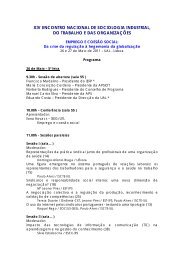Web-based Learning Solutions for Communities of Practice
Web-based Learning Solutions for Communities of Practice
Web-based Learning Solutions for Communities of Practice
Create successful ePaper yourself
Turn your PDF publications into a flip-book with our unique Google optimized e-Paper software.
towards the back-<strong>of</strong>fice functions, represents a<br />
significant detour, it is undertaken because the path<br />
taken does mark a significant step <strong>for</strong>ward. Not<br />
only in terms <strong>of</strong> the additional learning services<br />
that existing city portals are now able to <strong>of</strong>fer, but<br />
in ‘squaring <strong>of</strong> the circle’ and providing a plat<strong>for</strong>m<br />
with the intelligence - KMS and digital library - to<br />
integrate the front, middle and back-<strong>of</strong>fice sections<br />
<strong>of</strong> their organization as a virtual CoP. As a virtual<br />
CoP that in this instance is <strong>based</strong> on standards<br />
which are interoperable across a growing pool <strong>of</strong><br />
extensible eGov services and have the capacity<br />
to support socially-inclusive and participatory<br />
urban regeneration programs.<br />
THE ‘ETOPIA’ DEMONSTRATOR<br />
At present this integration is mainly technical,<br />
concerning the s<strong>of</strong>tware developments needed to<br />
host such services and meet with the semantics<br />
<strong>of</strong> the plat<strong>for</strong>m’s e-learning needs, knowledge<br />
transfer requirements and capacity building<br />
commitments. This currently takes the <strong>for</strong>m <strong>of</strong><br />
an ‘eTopia’ demonstrator, showing in sessionmanaged<br />
logic how the eCity plat<strong>for</strong>m accesses<br />
the extensive pool <strong>of</strong> eGov services located in the<br />
back-<strong>of</strong>fice and uses the intelligence embedded<br />
in the middleware to deliver Level 3 (advanced<br />
e-Citizenship) courses on the consultative needs<br />
and deliberative requirements <strong>of</strong> such developments.<br />
This provides a ‘real time’ demonstration’<br />
<strong>of</strong> the plat<strong>for</strong>m’s capacity to be ‘SMART’ in<br />
developing both the technical and semanticallyrich<br />
content required <strong>for</strong> the middleware to begin<br />
supporting the socially-inclusive consultations<br />
and participatory deliberations <strong>of</strong> urban regeneration<br />
programmes. These enhanced processes<br />
<strong>of</strong> consultation and deliberation also have the<br />
advantage <strong>of</strong> <strong>of</strong>fering citizens multi-channel<br />
access to such eGov services, presented to them<br />
as socially-inclusive and participatory urban regeneration<br />
programmes designed to bring about<br />
276<br />
The IntelCities Community <strong>of</strong> <strong>Practice</strong><br />
improvements in the quality <strong>of</strong> life (Deakin and<br />
Allwinkle, 2007). This goes a long way to:<br />
• Uncover the business logic needed to base the<br />
intelligence-driven (re)organization <strong>of</strong> cities<br />
on and standards required to benchmark the<br />
per<strong>for</strong>mance <strong>of</strong> the plat<strong>for</strong>m against.<br />
• Provide the per<strong>for</strong>mance-<strong>based</strong> measures<br />
needed to assess whether any plans cities<br />
posses to develop eGov services (over the<br />
plat<strong>for</strong>m) have the embedded intelligence<br />
(the learning, knowledge-<strong>based</strong> competencies<br />
and skills) required to support such<br />
actions.<br />
• Also provide the means to evaluate if such<br />
planned developments build the (intellectual)<br />
capacity – learning, knowledge-<strong>based</strong><br />
competencies and skills – needed to support<br />
such actions.<br />
TESTING THE ETOPIA<br />
DEMONSTRATOR<br />
In addition to developing the semantically-interoperable<br />
eGov services, the IntelCities’ CoP<br />
has also sought to evaluate how well they per<strong>for</strong>m<br />
as components <strong>of</strong> the eCity plat<strong>for</strong>m. This has<br />
meant developing three ‘eTopia demonstrator’<br />
storylines, where the typical learners referred to<br />
previously, use the eCity plat<strong>for</strong>m to query the<br />
development <strong>of</strong> urban regeneration programmes<br />
by either searching <strong>for</strong> in<strong>for</strong>mation on a given<br />
initiative, gaining accessing to possible online<br />
transactions supporting any such actions, or<br />
about getting involved in the consultations and<br />
deliberations underlying the governance <strong>of</strong> such<br />
proposals.<br />
The three storylines developed scenarios<br />
<strong>for</strong>:<br />
• Accessing local services in neighbourhoods<br />
subject to regeneration.<br />
• Carrying out online transactions related to<br />
the use <strong>of</strong> land.



